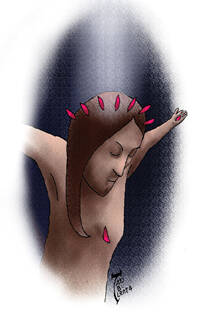Into the Light
These days, it is hard to miss John 3:16. This is especially true if you are a sports fan; placards reading “John 3:16” are often spotted behind home plate, near end zones and throughout basketball arenas. The Denver Broncos quarterback Tim Tebow even etches the verse into the anti-glare black grease under his eyes. (Let’s not get started on his having passed 316 yards in the upset playoff win against the Steelers at the end of the season.)
This oft-cited passage comes from today’s Gospel: “For God so loved the world that he gave his only begotten Son, that everyone who believes in him might not perish but might have eternal life.” This is a crucial piece in a much longer conversation Jesus has with the Pharisee Nicodemus. He approaches Jesus at night, in which Jesus represents “the light that has come into the world” (3:19). Jesus tells him that one must be “born from above.” Nicodemus scratches his head. Jesus tells him that one must be “born of water and the Spirit.” Again Nicodemus scratches his head.
How will Nicodemus (and we) escape this darkness? In Jesus’ final response he assures Nicodemus, “Just as Moses lifted up the serpent in the desert, so must the Son of Man be lifted up, so that everyone who believes in him may have eternal life.” Later he will say, “When you have lifted up the Son of Man, then you will realize that I am” (8:28) and “When I am lifted up from the earth, I will draw everyone to myself” (12:32). There is something about the cross that makes it both an icon of God and a magnet for our souls.
What is it about the cross that draws us, that reveals the divine presence, that heals us when we gaze upon it? For Jesus, the cross is his hour and glory (12:23ff, 17:1), the ultimate expression of how “God so loved the world.” By making himself a total offering, he expresses the radiant light of divine love. His glory is in his self-emptying; his wealth exists as gift.
Now that the savior of the world has drawn us to the cross, what are we to do? John 3:16 tells us that we are to believe in him. The theme of belief in Jesus dominates John’s Gospel. But believing is not simply intellectually accepting the claim, “Jesus is Lord.” Theological truths are important, but this is not the point. Even demons believe the truth about God “and tremble” (Jas 2:19). Jesus challenges us to literally “believe into” (pisteu? eis) him, that is, we enter into him and fully entrust ourselves to him. “Where I am, there also will my servant be” (12:26).
Believing into Jesus is one of two dominant themes in John’s Gospel; the other is love. To enter into the gift of Jesus is to know and live his love: “As the Father loves me, so I also love you. Remain in my love” (15:9) and “As I have loved you, so you also should love one another” (13:34).
Have you ever forgiven someone for something really serious, and done so freely and completely, as pure gift? Have you ever given yourself over to another’s need so completely that thoughts about yourself vanished entirely? Have you ever experienced love of God so completely that you seemed to disappear and what remained seemed only divine? If you answered yes to any of these, you know something of the great mystery of the cross.
The cross is a blazing icon of divine love. Whoever sees it and believes in the Lord may have eternal life. Wonderfully, after having experienced the glory of the cross, we find Nicodemus, now a disciple, risking his life to help prepare the body of the Lord for burial (19:39).
This article also appeared in print, under the headline “Into the Light,” in the March 12, 2012, issue.








